TimTaiLieu.vn - Tài liệu, ebook, giáo trình, đồ án, luận văn
Tổng hợp tất cả tài liệu, ebook, giáo trình Khối Ngành Kinh Tế chọn lọc và hay nhất.

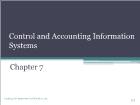 Bài giảng Romney_ais13 - Chapter 7: Control and Accounting Information Systems
Bài giảng Romney_ais13 - Chapter 7: Control and Accounting Information SystemsLearning Objectives Explain basic control concepts and why computer control and security are important. Compare and contrast the COBIT, COSO, and ERM control frameworks. Describe the major elements in the internal environment of a company. Describe the four types of control objectives that companies need to set. Describe the events that affect...
 21 trang | Chia sẻ: nguyenlinh90 | Ngày: 19/07/2019 | Lượt xem: 996 | Lượt tải: 0
21 trang | Chia sẻ: nguyenlinh90 | Ngày: 19/07/2019 | Lượt xem: 996 | Lượt tải: 0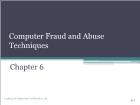 Bài giảng Romney_ais13 - Chapter 6: Computer Fraud and Abuse Techniques
Bài giảng Romney_ais13 - Chapter 6: Computer Fraud and Abuse TechniquesLearning Objectives Compare and contrast computer attack and abuse tactics. Explain how social engineering techniques are used to gain physical or logical access to computer resources. Describe the different types of malware used to harm computers.
 17 trang | Chia sẻ: nguyenlinh90 | Ngày: 19/07/2019 | Lượt xem: 1013 | Lượt tải: 0
17 trang | Chia sẻ: nguyenlinh90 | Ngày: 19/07/2019 | Lượt xem: 1013 | Lượt tải: 0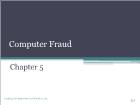 Bài giảng Romney_ais13 - Chapter 5: Computer Fraud
Bài giảng Romney_ais13 - Chapter 5: Computer FraudLearning Objectives Explain the threats faced by modern information systems. Define fraud and describe both the different types of fraud and the process one follows to perpetuate a fraud. Discuss who perpetrates fraud and why it occurs, including the pressures, opportunities, and rationalizations that are present in most frauds. Define computer...
 13 trang | Chia sẻ: nguyenlinh90 | Ngày: 19/07/2019 | Lượt xem: 1138 | Lượt tải: 0
13 trang | Chia sẻ: nguyenlinh90 | Ngày: 19/07/2019 | Lượt xem: 1138 | Lượt tải: 0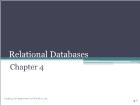 Bài giảng Romney_ais13 - Chapter 4: Relational Databases
Bài giảng Romney_ais13 - Chapter 4: Relational DatabasesLearning Objectives Explain the importance and advantages of databases, as well as the difference between database and file-based legacy systems. Explain the difference between logical and physical views of a database. Explain fundamental concepts of database systems such as DBMS, schemas, the data dictionary, and DBMS languages. Describe what ...
 18 trang | Chia sẻ: nguyenlinh90 | Ngày: 19/07/2019 | Lượt xem: 1135 | Lượt tải: 0
18 trang | Chia sẻ: nguyenlinh90 | Ngày: 19/07/2019 | Lượt xem: 1135 | Lượt tải: 0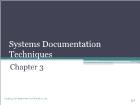 Bài giảng Romney_ais13 - Chapter 3: Systems Documentation Techniques
Bài giảng Romney_ais13 - Chapter 3: Systems Documentation TechniquesLearning Objectives Prepare and use data flow diagrams to understand, evaluate, and document information systems. Prepare and use flowcharts to understand, evaluate, and document information systems. Prepare and use business process diagrams to understand, evaluate, and document information systems.
 14 trang | Chia sẻ: nguyenlinh90 | Ngày: 19/07/2019 | Lượt xem: 970 | Lượt tải: 0
14 trang | Chia sẻ: nguyenlinh90 | Ngày: 19/07/2019 | Lượt xem: 970 | Lượt tải: 0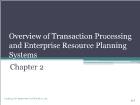 Bài giảng Romney_ais13 - Chapter 2: Overview of Transaction Processing and Enterprise Resource Planning Systems
Bài giảng Romney_ais13 - Chapter 2: Overview of Transaction Processing and Enterprise Resource Planning SystemsDescribe the four parts of the data processing cycle and the major activities in each. Describe documents and procedures used to collect and process transaction data. Describe the ways information is stored in computer-based information systems. Discuss the types of information that an AIS can provide. Discuss how organizations use enterpris...
 15 trang | Chia sẻ: nguyenlinh90 | Ngày: 19/07/2019 | Lượt xem: 975 | Lượt tải: 0
15 trang | Chia sẻ: nguyenlinh90 | Ngày: 19/07/2019 | Lượt xem: 975 | Lượt tải: 0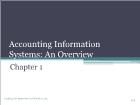 Bài giảng Romney_ais13 - Chapter 1: Accounting Information Systems: An Overview
Bài giảng Romney_ais13 - Chapter 1: Accounting Information Systems: An OverviewDistinguish between data and information: Understand the characteristics of useful information. Explain how to determine the value of information. Explain fundamental decisions an organization makes: Understand basic information needed to make them. Identify the transactional information that passes between internal and external parties and an...
 17 trang | Chia sẻ: nguyenlinh90 | Ngày: 19/07/2019 | Lượt xem: 952 | Lượt tải: 0
17 trang | Chia sẻ: nguyenlinh90 | Ngày: 19/07/2019 | Lượt xem: 952 | Lượt tải: 0 Chapter 22: Systems Design, Implementation, and Operation
Chapter 22: Systems Design, Implementation, and OperationDiscuss the conceptual systems design process and the activities in this phase. Discuss the physical systems design process and the activities in this phase. Discuss the systems implementation and conversion process and the activities in this phase. Discuss the systems operation and maintenance process and the activities in this phase.
 14 trang | Chia sẻ: nguyenlinh90 | Ngày: 19/07/2019 | Lượt xem: 1003 | Lượt tải: 0
14 trang | Chia sẻ: nguyenlinh90 | Ngày: 19/07/2019 | Lượt xem: 1003 | Lượt tải: 0 Chapter 21: AIS Development Strategies
Chapter 21: AIS Development StrategiesLearning Objectives Describe how organizations purchase application software, vendor services, and hardware. Explain how information system departments develop custom software. Explain how end users develop, use, and control computer- based information systems. Explain why organizations outsource their information systems, and evaluate the bene...
 14 trang | Chia sẻ: nguyenlinh90 | Ngày: 19/07/2019 | Lượt xem: 996 | Lượt tải: 0
14 trang | Chia sẻ: nguyenlinh90 | Ngày: 19/07/2019 | Lượt xem: 996 | Lượt tải: 0 Chapter 20: Introduction to Systems Development and Systems Analysis
Chapter 20: Introduction to Systems Development and Systems AnalysisLearning Objectives Explain the five phases of the systems development life cycle. Discuss the people involved in systems development and the roles they play. Explain the importance of systems development planning and describe planning techniques. Discuss the various types of feasibility analysis and calculate economic feasibility. Explain why...
 16 trang | Chia sẻ: nguyenlinh90 | Ngày: 19/07/2019 | Lượt xem: 1242 | Lượt tải: 0
16 trang | Chia sẻ: nguyenlinh90 | Ngày: 19/07/2019 | Lượt xem: 1242 | Lượt tải: 0
Website đang trong thời gian thử nghiệm, chờ xin giấy phép của Bộ TT & TT.

